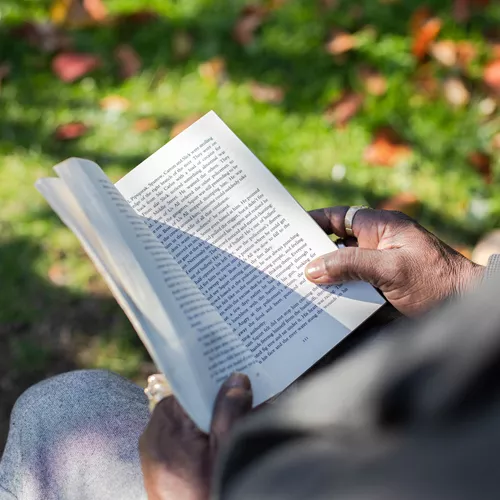Depression
Learn about depression, its symptoms and possible causes, and how you can access treatment and support. Find tips on caring for yourself, and guidance for friends and family.
What treatments are there for depression?
This page covers:
I really struggled with the SSRIs, even though my GP told me that was the only course of action. They made me feel worse than I did to start with, then incredibly tired. I fought for a referral for CBT and in the end it saved me.
Self-help resources
A self-help resource might be the first treatment option your doctor offers you. This is more likely if your depression is less severe.
These resources can be accessed faster than other treatments. And they could help you feel better without needing to try other options. Your GP might recommend that you try one of the following:
- A guided self-help programme. These often focus on how your thoughts, feelings, beliefs and behaviour interact. And they can teach you skills to help you cope with how you feel. A healthcare professional should support you and check your progress through the programme. This support may be online, face-to-face or over the phone.
- A physical activity programme, such as a group exercise class. These classes are designed for people with depression. Your GP may also be able to help you access other exercise programmes for free or lower cost. Whether you can access this may depend on where you live, and your financial situation. Speak to your GP to find out more about this.
Talking therapies
The National Institute for Health and Care Excellence (NICE) recommends the following talking therapies to treat depression:
- Cognitive behavioural therapy (CBT)
- Group CBT
- Behavioural activation (BA)
- Group BA
- Group mindfulness-based therapy
- Interpersonal psychotherapy (IPT)
- Counselling
- Short-term psychodynamic psychotherapy (STPP)
- Problem-solving therapy
- Behavioural couples therapy – if you doctor agrees that it may be useful to involve your partner in your treatment, because your relationship may be contributing to your depression
See our page on types of talking therapy to find out more about these treatments.
Unfortunately, we know that in many places NHS waiting lists for talking therapies can be very long. Your doctor can talk to you about which options are available in your area. And they can help you find the right kind of therapy for you.
Referring yourself to therapy
In England, you may be able to refer yourself for therapy via the NHS Talking Therapies for anxiety and depression programme. This was previously known as Improving Access to Psychological Therapies (IAPT).
Visit the NHS website’s therapy finder tool to find a therapy service near you, if you want to refer yourself.
Talking things through with a counsellor or therapist really helps me to see things more rationally and make connections between reality and inside my head.
Should I stop therapy if I start to feel better?
If you're having therapy and start to feel better, this doesn’t mean you have to stop. You can discuss your mood with your therapist and talk about what options might be right for you.
For example, NICE guidelines recommend group CBT or mindfulness-based cognitive therapy to help you stay well if you've experienced depression in the past. These can help even if you haven't used talking therapy before.

Opening up about depression
The more I opened up in counselling, the less of a burden I felt on my shoulders.
Medication
Your GP may offer you medication to treat your depression, such as antidepressants. This is more likely if the depression you’re experiencing is severe. Or if you’ve tried other treatments but they haven’t helped.
They might offer medication as a treatment on its own. Or they might recommend taking medication as well as having talking therapy.
We have information about the different types of antidepressant:
- Selective serotonin reuptake inhibitors (SSRIs)
- Serotonin and norepinephrine reuptake inhibitors (SNRIs)
- Tricyclics
- Monoamine oxidase inhibitors (MAOIs)
- Other antidepressants
In some cases, your doctor may also prescribe lithium alongside antidepressants. This is most likely if you have severe depression, or your depression keeps coming back. And it is usually when you have tried antidepressants on their own and they aren't working.
Some of us may also experience psychotic symptoms as part of depression. In this case, your healthcare team may prescribe antipsychotic medication, alongside your depression treatment. See our pages on antipsychotics for more information.
You may find medication that works for you right away. Or you might need to try out a few types of medication before finding one that works for you. Some of us may find that medication isn’t the right treatment at all. You can speak to your doctor about your different options.
How long will I need to take medication for?
NICE guidelines recommend that you keep taking antidepressants for at least 6 months after an episode of depression ends.
But some of us may choose to continue taking medication for a longer period. For example, we may have had several episodes of depression in the past. So we might want to keep taking medication to prevent future episodes.
Coming off medication
If you're taking medication for depression, it's important not to stop suddenly. Withdrawal symptoms from antidepressants can be difficult to cope with. And for some medications, stopping suddenly can be dangerous.
If you decide to try coming off your medication, make sure to:
- Talk to the person who prescribed the medication, or another health professional who understands the process
- Find out the possible risks and how to minimise them
- Come off gradually, over a period of time
Whether you continue or stop taking antidepressant medication is usually your decision. You normally have the right to refuse a medication or stop taking it. This is true even if your doctor thinks this might make your depression worse.
The situations in which you may not have this right are when:
- You're sectioned under some sections of the Mental Health Act
- You don’t have mental capacity to decide whether to have treatment, and the treatment is in your best interests.
See our pages on coming off psychiatric medication for more information.
Esketamine
Recent research has looked at using a medicine called esketamine to treat depression. This has focused on depression that has not responded to other treatments.
NICE guidelines do not currently recommend using esketamine to treat depression. Because of this, doctors are unlikely to prescribe it as a treatment for depression on the NHS. But it is available in some private clinics.
Antidepressants have helped to put me in a place where I was more able to cope with counselling. This required a lot of hard work and I had to accept a completely different way of thinking.
Other treatments for depression
There are lots of other treatments that you can try to help with your depression. You might try these on their own, or alongside medication and talking therapies.
These include:
- Arts and creative therapies
- Complementary and alternative therapies
- Mindfulness
- Ecotherapy
- Peer support
Your doctor may be able to refer you to services offering these treatments. Or you may be able to try some of them yourself.
You can also contact your local Mind to find out whether they have any of these available in your area.
Taking care of my diet and body, talking and alternative methods work far better for me.
What happens if medication or therapy aren’t working?
If you've already tried a talking therapy or medication, your doctor may discuss some different options with you.
At first, they're most likely to offer you other types of talking therapy or medication. This is in case you can find something else that works for you.
But in some cases, there are some other treatments that your doctor may discuss with you. These treatments are rarely used. They are usually only offered if you experience severe depression that has not improved with other treatments:
Electroconvulsive therapy (ECT)
Electroconvulsive therapy (ECT) is a treatment that involves sending an electrical current through your brain.
NICE guidelines say that doctors should only offer this in certain, rare situations. For example, if you're experiencing a long and severe period of depression and other treatments haven’t worked. Or you’re in a life-threatening situation.
If you feel like you're in this situation, you could discuss ECT with your doctor. They should make sure you have clear and accessible information about ECT, so you understand it before deciding whether to have it.
See our pages on ECT for more information about this treatment and when it can be performed. And see our legal pages on consent to treatment and the Mental Capacity Act 2005 for information about your legal rights regarding treatment.
Repetitive transcranial magnetic stimulation (rTMS)
Repetitive transcranial magnetic stimulation (rTMS) is a treatment where your brain is stimulated using magnetic fields. NICE guidelines say that doctors can offer this treatment for severe depression, if it hasn't responded to other treatments.
Neurosurgery, VNS and DBS
Neurosurgery for mental disorder (NMD) is only performed extremely rarely. Doctors will only offer it if all other treatments have failed. You can never be given neurosurgery without your consent. See our page on NMD for more information.
There are also similar treatments to NMD, which are reversible. For example, deep brain stimulation (DBS) and vagus nerve stimulation (VNS). These can be used to treat severe depression, although they are also both performed very rarely.
A majority of the treatments I tried were ineffective – but at crisis point, about to be admitted to a psychiatric hospital, I started Interpersonal Psychotherapy and Sertraline. I can honestly say that they saved my life.
This information was published in April 2023. We will revise it in 2026.
References and bibliography available on request.
If you want to reproduce this content, see our permissions and licensing page.













